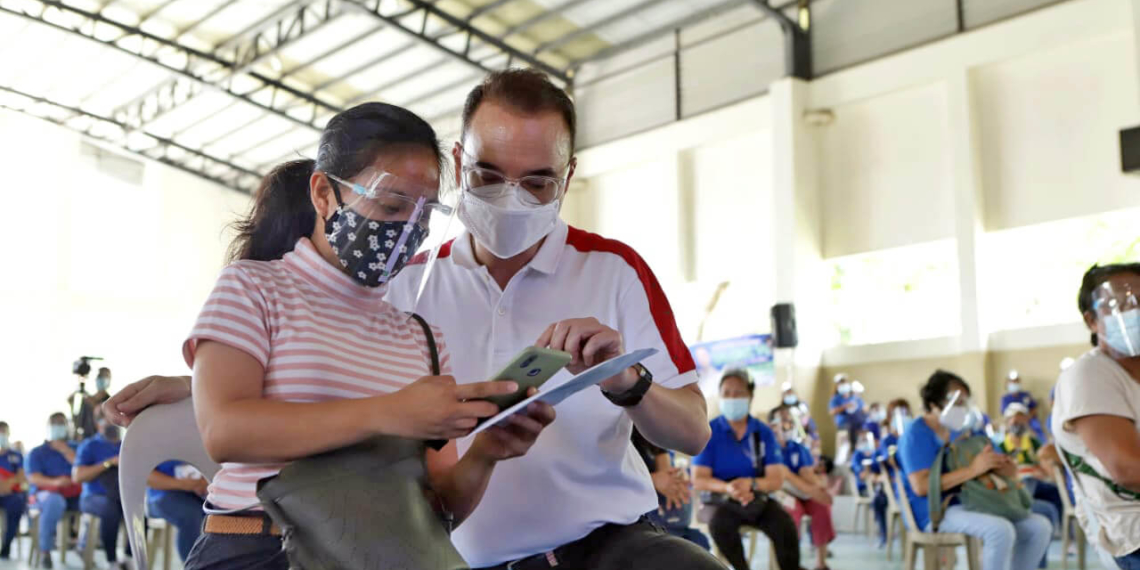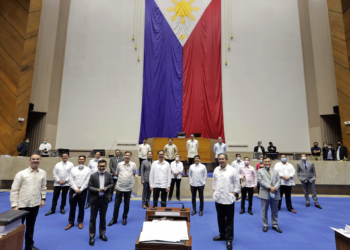
A year later and jeepney routes are still minimized, businesses are closed, many are unemployed. Even worse, the price of pork is higher, rice is more expensive, and anywhere you go – from Ilocos to Zamboanga – majority of people are struggling. This is the reality brought on by the pandemic – the poor became poorer and they are slowly losing hope.
This is the reason why in early February of this year, Alan filed a bill in Congress to provide a one-time cash assistance of P10,000 to each Filipino family. He also mentioned that the Philippines provided one of the lowest stimulus packages in Asia. Alan points out that US President Joe Biden has recently unveiled a stimulus package, where every American was provided US$1,400 to help them with their immediate needs and to jumpstart businesses in their communities.
“President Biden believes that a crisis of pandemic proportions requires a major solution – to vaccinate 100 million Americans, to provide stimulus checks, to do a jobs and infrastructure plan – that will save the economy. This is like a four-punch combination to fight the disastrous effects of the global pandemic,” says Alan. “So what we are proposing is something like that… a 1-2-3 combination that is unheard of, but one we desperately need at this time.”

Alan explains that this combination includes, first, a direct stimulus of P10,000; second, a stimulus for the economy; and third, assistance for businesses, employees, and micro, small, and medium enterprises or the MSMEs.
“This is not just a dole-out… this is to give ‘bwelo’ to families, workers, and businessmen – a ‘helping hand’ in this continuing crisis,” says Alan.
As for critics of his proposal who say that the country has no money to fund the P10,000 ayuda, Alan believes that it is not about “lack of money,” but underutilization of funds and misinformation.
“When we proposed to provide the ayuda of P10,000 for each Filipino family, we did not have any intention to have enemies. We only have one enemy here, and that is COVID.” – Alan
“We don’t want to have enemies here because our only enemy is COVID, and that’s it,” says Alan. “We’re not quarreling against other members of Congress, or the President’s Secretaries, or the President himself. But if there’s only one group that’s deciding for all, it poses a lot of problems and there is a lot of misinformation. The mayors, for example, are on the ground… the barangay captains are on the grassroots, while members of Congress consult with the people. So if we say that cities and provinces in the NCR+ are the ones that were given the P4,000 per household ayuda, this is good but it’s not enough. We have to realize that it is the entire country and majority of Filipinos that are experiencing a crisis of unemployment, poverty, and hunger.”

To speed up the deliberation of the bill, Alan proposed to call for a hearing or special session so that his group can show that “there is money for the P10,000 ayuda plus other items such as acquiring PPEs, vaccines, and building of quarantine facilities.”
“If in 2020 we were able to allocate P500 billion for Bayanihan 1 and another round of funding for Bayanihan 2, then the 2021 budget should have more allocations for this crisis,” he reveals, noting that we only have to look and learn from our neighbors such as Malaysia, Thailand, and Indonesia who have a “proactive and not a reactive approach” with regards to economic stimulus.
“We have to wonder why our neighbors were able to cushion their economies during their crisis with a stimulus of USD 20 to 75 billion dollars. We are the smallest at USD 10 billion but we announced pre-pandemic that our economic growth was faster and better than our neighbors. So what happened? Why are we now lagging behind?”

Alan says this is not the time to point fingers but to learn from past mistakes. It has been one year, he says, since the Bayanihan 1 bill was passed, yet there is still no transparency if all the funds were already used. And if used, did those funds go to the necessary requirements to fight the pandemic?
“If there is any negligence, whether deliberate or due to other reasons, the people have the right to know. Why are we afraid of a hearing? My assistance to this administration is to be truthful at all times. The President and his Cabinet have the right to utilize those funds, and we know that they mean well and worked tirelessly. But this extraordinary problem requires extraordinary solutions,” Alan concludes.
“It is not okay to tell the President that everything is being done well. Because at the end of the day, this misinformation will hurt the Filipino people who have already sacrificed their jobs, and some, their lives. Let us solve this crisis by thinking big so that Filipinos will not lose their hopes for their future.”





